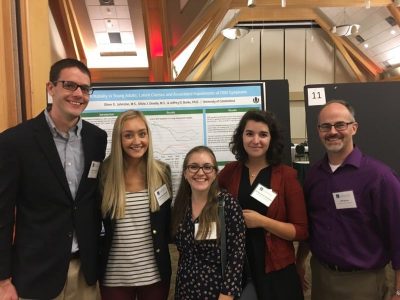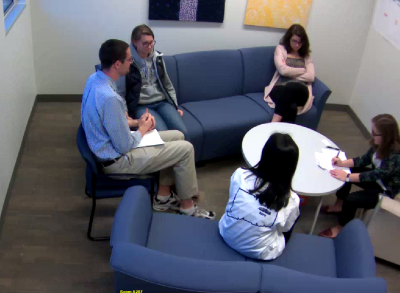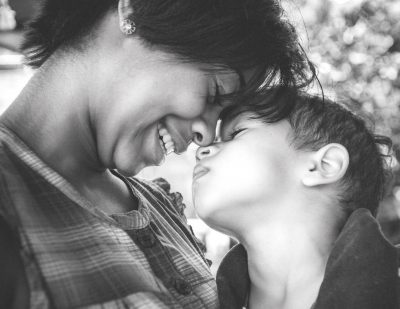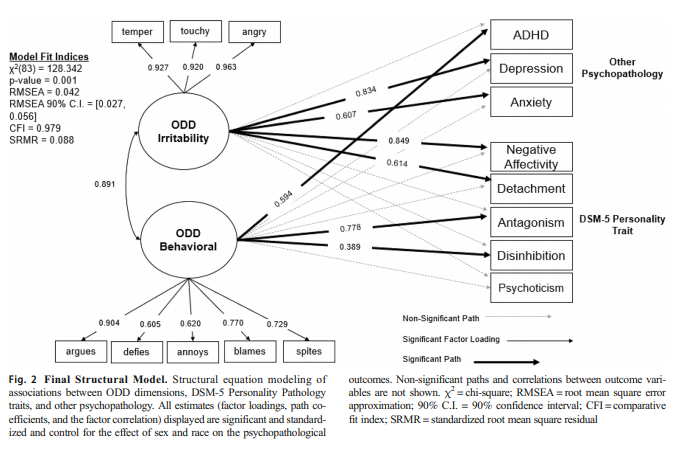 |
The BADCO Lab focuses on describing the etiology, development, outcomes and treatment efforts related to behavioral disorders and irritability. Work by faculty and graduate student researchers in the lab includes efforts to distinguish irritable and behavioral dimensions of oppositional defiant disorder from childhood through early adulthood, to test emotion regulation skills as both an etiological factor and a target for intervention, to identify factors related to service use and to barriers to service engagement, and to describe the effects of behavioral disorders in different contexts and across a variety of possible outcomes. Because of the nature of the data sets available and the research questions being asked, the lab regularly employs a variety of advanced statistical techniques. Recent data collection efforts have included the implementation of a treatment module for chronic irritability, data collection involving coregistration of EEG and fMRI data, and collection of symptom-oriented data from young adult populations. These efforts describe the future directions for the lab, which will include further development of interventions for irritability, the use of neurobiological measures to validate models of chronic irritability, and further groundbreaking efforts to describe irritability and behavioral dysregulation across the early life span. |  |
Recent Projects

The Development of an Irritability Treatment Module for Children
This project involves the development and implementation of a group-based treatment for chronic irritability in children. Pilot data will be collected to examine the feasibility and tolerability of the intervention, as well as the efficacy of the treatment. The results will be used “as a foundation for larger projects to validate and disseminate the treatment.
- Derella, O. J., Burke, J. D., Romano-Verthelyi, A. M., Butler, E. J., & Johnston, O. G. (2020). Feasibility and acceptability of a brief cognitive-behavioral group intervention for chronic irritability in youth. Clinical Child Psychology and Psychiatry, 25(4), 778-789. https://doi.org/10.1177/1359104520918331
- Butler, E.J., Derella, O.J., Johnston, O.G., Romano-Verthelyi, A.M., & Burke, J.D. (2019, September) The development of a brief cognitive-behavioral group intervention to treat pediatric chronic irritability. Poster presented at the 3rd Congress on Pediatric Irritability and Dysregulation, Burlington, VT.
- Derella, O.J., Johnston, O.G., Romano-Verthelyi, A.M., Yum-Chan, S.Y., & Burke, J.D. (2018, May). Feasibility and Acceptability of a Brief Cognitive-Behavioral Group Intervention for Childhood Irritability. Poster presented at the 30th Annual Association for Psychological Sciences (APS) Convention, San Francisco, CA.
Dyadic Emotion-Related Processes in Irritable and Comparison Youth
There has been limited empirical investigation of the emotional processes at the individual and dyadic (parent-child) level that contribute to the manifestation of chronic irritability (CI) in childhood. The goals of this study are to (1) examine multi-method evidence of the roles of frustration reactivity and distress tolerance DT in the development of CI, (2) test a novel explanatory model of the relationships among parenting, distress tolerance, and CI, and (3) examine external and internal factors that may differ between children with CI and those without.
- Derella, O.J., Butler E.J., Simpson, H., Girardini, K.N., Yum-Chan, S.Y., & Burke, J.D. (2019, September). Childhood chronic irritability and emotional processes in parents and youth: Preliminary multi-method findings. Poster presented at the 3rd Congress on Pediatric Irritability and Dysregulation, Burlington, VT.




Oppositional Defiant Disorder in Young Adults
This ongoing study gathers data on the prevalence and structure of ODD symptoms in young adults as well as the unique associations between ODD symptoms and impairment, pathological personality traits, and mental health service use. This study also explores several hypothesized mechanisms for the service engagement and treatment of ODD in this population.
- Johnston, O.G., Cruess, D.G., & Burke, J.D. (2020, November). Chronic irritability in young adults: Associations with personality pathology, emotion regulation and coping strategies, and attitudes towards mental health services. In S. Evans (Chair), Advancing the Clinical Evidence Base for Irritability: New Insights Across Development and Diagnostic Boundaries. Symposium conducted virtually at the 54th Annual Convention of the Association for Behavior and Cognitive Therapies.
- Johnston, O.G., Cruess, D.G., & Burke, J.D. (2020) Irritability and behavioral dimensions of ODD in young adults: Associations with DSM-5 pathological personality traits. Journal of Psychopathology and Behavioral Assessment, 42(3), 424-435. https://doi.org/10.1007/s10862-020-09786-8
- Johnston, O.G., Barber, J., Derella, O.J., & Burke, J.D. (2019, November). Identifying intervention targets for oppositional defiant disorder symptoms in college students. Poster presented at the 53rd Annual Convention of the Association for Behavior and Cognitive Therapies, Atlanta, GA.
- Johnston, O.G., Derella, O.J., & Burke, J.D. (2018). Identification of oppositional defiant disorder in young adult college students. Journal of Psychopathology and Behavioral Assessment, 40(4), 563-572. doi.org/10.1007/s10862-018-9696-0
- Johnston, O.G., Derella, O.J., & Burke, J.D. (2017, September). Irritability in young adults: Latent classes and associated impairments of ODD symptoms. Poster presented at the 2nd Congress on Pediatric Irritability and Dysregulation, Burlington, VT.
- Burke, J.D., Johnston, O.G., & Derella, O.J. (2017, August). Identification and validation of the irritability dimension in a young adult population. In S. Evans & J.D. Burke (Co-Chairs), Severe Irritability and Where to Find It. Symposium conducted at the meeting of the American Psychological Association, Washington D.C.
- Johnston, O.G., Derella, O.J, Dalal, D.K., & Burke, J.D. (2015, September). Irritability and defiant behavioral symptom dimensions of oppositional defiant disorder in emerging adulthood. Poster presented at the 1st Congress on Pediatric Irritability and Dysregulation, Burlington, VT.
Argentine Experts’ Conceptualizations of Behavioral Disorders: A Qualitative Investigation
The goal of this study is to gather preliminary qualitative data about Argentine experts' conceptualizations of the etiology, identification, and treatment of behavioral disorders. Data was collected in Buenos Aires, Argentine via thirty-minute interviews with five teachers, five pediatricians, and five mental health providers.
- Romano-Verthelyi, A.M., Milan, S., Johnston, O.G., & Burke, J.D. (2019, March). Argentine professionals’ conceptualizations of barriers and facilitators to children’s mental health. Poster presented at the Society for Research and Child Development (SRCD) 2019 Biennial Meeting, Baltimore, M.D.
- Spotlight Article from UConn's El Instituto https://elin.uconn.edu/2019/02/04/tinker-spotlight/


Brain Function and the Processing of Emotions
Using simultaneous fMRI and EEG imaging techniques, this project looks to study the neural systems involved in the processing of emotions. In particular, determining whether are differences in the way the brain functions with people exhibiting high levels of irritability compared to those who do not.
- Ly, M., Michaels, T., Molfese, P., Chen, C-M., Wang, L. & Burke, J.D. (2017, June). Feedback negativity in arithmetic task distinguishes dimensions of ODD. Poster presented at the Annual Meeting of the Organization for Human Brain Mapping, Vancouver, British Columbia, Canada.
- Michaels, T., Ly, M., Molfese, P., Wang, L., Chen, C-M. & Burke, J.D. (2017, June) Resting state functional connectivity in oppositional defiant disorder. Poster presented at the Annual Meeting of the Organization for Human Brain Mapping, Vancouver, British Columbia, Canada.
Representative Publications from Past Projects
Developmental Trends Study |
|
Parent Help-Seeking Study |
|
SNAP Pittsburgh Study |
|
Contact Information
| Phone: | 860-486-1129 |
|---|---|
| E-mail: | jeffrey.burke@uconn.edu |